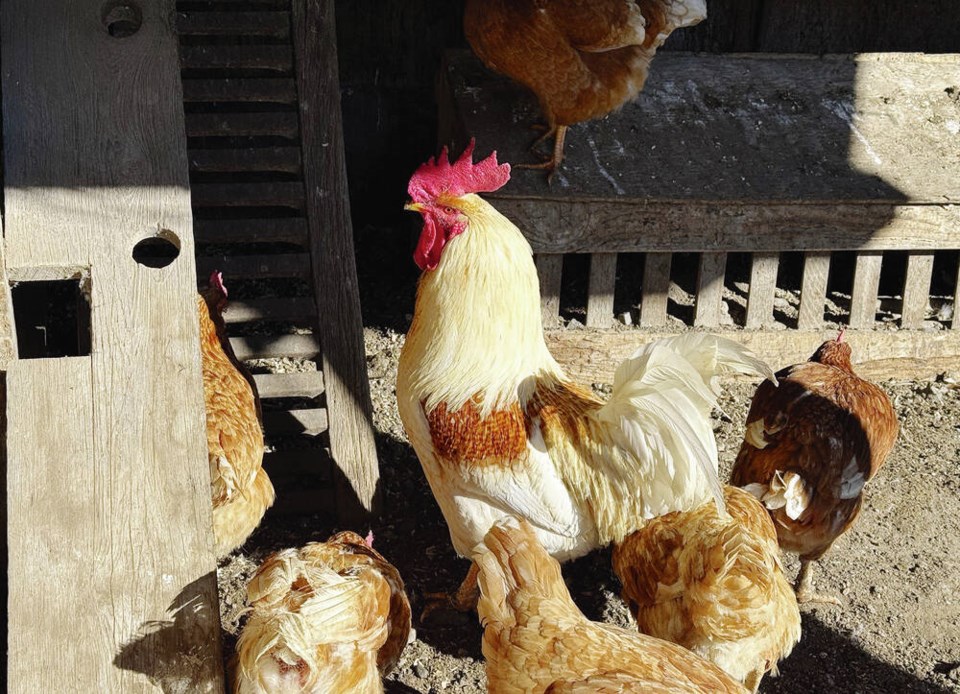The avian influenza virus has been detected at a non-commercial poultry farm in the capital region, according to the Canadian Food Inspection Agency.
The agency could not immediately respond to questions Thursday, but its website reported that “highly pathogenic avian influenza” was detected on a non-commercial poultry farm in the Capital Regional District on Nov. 21. The agency defines non-commercial poultry as birds raised in flocks of fewer than 1,000 birds total, and fewer than 300 waterfowl such as ducks and geese, for producing or selling locally or for breeding.
B.C. Agriculture Minister Lana Popham said the virus was found in a flock of about 60 chickens on the Saanich Peninsula. The name and location of the farm was not revealed.
“It’s the time of year when wild birds are migrating, and unfortunately, with them they’re bringing avian influenza, which is extremely contagious to our domestic poultry industry, and that includes backyard chickens,” Popham said. She was informed of the infection last week.
Popham said response to the avian flu in B.C. is a federal responsibility. Prevention measures include ensuring chickens remain indoors and that no equipment comes in and out of farms or moves between farms.
The flock will likely have to be killed, which is an emotionally and financially draining experience, she said. Whether it’s a commercial or non-commercial farm, farmers often live on their farms with their families, “so it’s a really difficult issue for family farms to deal with,” said Popham.
“It’s devastating to the farmers — they have to be really brave to get through it — and there’s also some financial implications.”
Popham said she’s received some complaints that compensation for the bird culls has been slow to arrive from the Canadian Food Inspection Agency, so she is drafting a letter to her federal counterpart asking that the payments be expedited to alleviate the financial pressure on farmers. “It’s just a really difficult nasty time [for farmers],” she said.
The agency said there is no treatment for infected birds, and Popham said it would be a long and painful death if the birds were left with the virus.
As of Thursday, 56 premises were reported to be infected with avian flu in B.C., of 65 in all of Canada.
Only in rare cases does the avian flu transmit to humans.
Provincial health officer Bonnie Henry gave an update this week on the first person in Canada reported to be infected with the avian flu, a teenager who is still on a respirator at B.C. Children’s Hospital.
Henry said no new cases or evidence of human-to-human transmission have been found.
The teen remains in critical condition with H5N1 bird flu but is stable and has made “some progress” toward recovery.
Henry said the investigation found the infection was not directly related to outbreaks of bird flu at B.C. poultry farms. Genome sequencing of the virus showed it most closely matched that of wild birds found in the Fraser Valley in early October.
“There may have been an intermediary, either another bird or an animal, between the geese that were detected and this young person,” she said.
“But very importantly, it also tells us that this genotype was quite different from what is causing the devastating outbreaks in the poultry industry. So we had no evidence from speaking to family and friends that this young person had been near poultry farms.”
Canadian Food Inspection Agency figures show that nearly 6.9 million birds in B.C. have died or been culled as a result of the avian flu virus.
While human cases of the virus continue to be rare, Henry said people can protect themselves by washing their hands, avoiding touching dead or sick animals, and staying up to date on immunizations, especially the seasonal flu vaccine.
Popham said anyone who sees dead wild birds should report it to the Canadian Food Inspection Agency so it can retrieve the carcass and test it. “While we see our commercial and domestic poultry flocks being affected there are also a number of wild birds being affected.”
— with files from The Canadian Press




